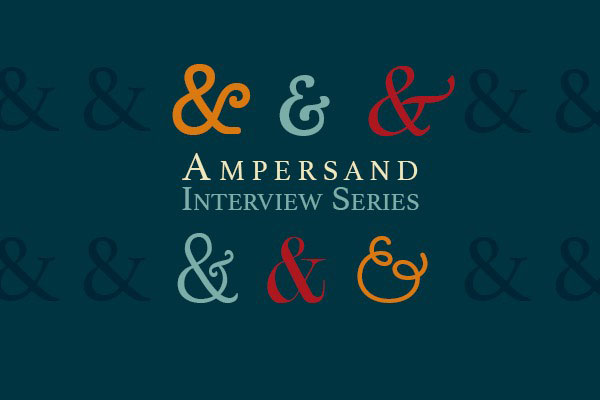
In the latest Ampersand Interview, we spoke with Esteban Rodriguez about his writing journey, developing habits, and how he writes today.
Rodriguez’s poem “Theophany” was published in Arts & Letters Issue 38.
A&L: Do you write with a lot of conscious awareness during your first drafts, or do you just try to get it out without overthinking?
Esteban Rodriguez: Each time I begin a new poem, I do so with the mindset that when the last word is written, the poem will be complete. Revision, however, is inevitable. My obligations to my ideas of what makes a poem intriguing and good compels me to go back to the work, changing whatever will bring the poem closer to where I feel it needs to be.
A&L: What sort of things did you write about when you first started writing?
ER: I wrote about the same things I continue to write today: the complexity of familial relationships, life along the border, the body, language, and the search for meaning in landscapes that aren’t always willing to share what exactly that meaning is. Although the topics and themes have remained relatively consistent, I’ve pushed the boundaries of my approach and style over the past few years, something I would have never conceived of doing when I first began writing.
A&L: How have you evolved as a writer over the years?
ER: As I mentioned previously, I’ve been more open to changing my style when a poem (or poems) calls for it. My first collection Dusk & Dust contains many narrative pieces that are two to three pages in length and that incorporate the landscape of the Rio Grande Valley (where I am from) quite prominently. Since then, my poems have been shorter, almost never going beyond a page, and the descriptive landscape of my youth only occupies a line or two if it’s necessary for the poem. Simultaneously, I’ve been writing poems that have a more surreal quality to them and my collection (Dis)placement explores hazardous journeys across terrains prone to violence, destruction, and the consequences of time and neglect. Recently, I’ve been experimenting with punctuation, or rather the lack of punctuation. I’ve found that writing a poem without commas or periods forces me to approach it differently, and that the lyricism of the poem is much more nuanced precisely because it allows me, as both a writer and a reader, the opportunity to examine the content of the piece with a different lens.
A&L: What is the toughest bad writing habit that you have had to break? Or do you advocate for embracing habits?
ER: A bad habit of mine is using certain lines and techniques that I’ve used in the past. I used to really like starting a poem with a one-word scene and transitioning the piece into the action that will take place. It would read something like “Nightfall, and the moon’s burden . . .” I remember writing about six poems back-to-back exactly like this and I knew, once I reviewed them, that I needed to break that habit. Occasionally, I still lean on this technique, but I’ve become much more aware of my habits and what it ultimately means if I cannot break them. For writers just starting their journey, however, I would recommend forming a habit, at least until they feel confident breaking from it. Writing, like anything, is about practice, and if that means doing the same thing over and over again until you get good at it, then that’s advice I think everyone can benefit from.
A&L: What is your writing space like? Where do you write most often? And what’s your routine?
ER: My writing space is whatever place I find myself in. I used to write in a notebook, but I’ve long abandoned that practice in favor of writing poems in the Notes app on my phone, which is much more convenient for writing on the go. I’m not burdened with having to find blank pages or reading through a labyrinth of messy handwriting. Because of this, my writing schedule is never consistent, but I do write throughout the day. And even if it is only for a few minutes, it’s time well spent.
A&L: Do you prefer to write in solitude or with some bustling around you?
ER: Both. If I am somewhere in public and a word, phrase, or line comes to mind, I try to write it down as quickly as possible, despite the commotion around me. Mornings on the weekends are where I find the most solitude, although I am probably cooking breakfast or playing with my dogs. What matters is being able to ponder the words that form the poem I am working on, and I try as much as possible not to let my voice get drowned out by my environment.
A&L: What is your guilty reading pleasure?
ER: I try not to read anything I feel won’t provide some form of knowledge in return, so I wouldn’t say I have a guilty reading pleasure. The books I choose to read are purposeful and if I don’t like a book, I don’t feel any obligation to continue reading it. Time is everyone’s antagonist, and because we are only here for a brief moment, I try to spend my days with books that will ultimately teach me what it means to be a better human being.
Esteban Rodriguez is the author of the collections Dusk & Dust (Hub City Press 2019), Crash Course (Saddle Road Press 2019), and (Dis)placement (Skull + Wind Press 2020). His poetry has appeared in The Gettysburg Review, New England Review, TriQuarterly, The Rumpus, and elsewhere. He is the Interviews Editor for the EcoTheo Review, a regular reviews contributor for PANK, and a poetry reader for BOAAT. He lives with his family and teaches in Austin, Texas.
